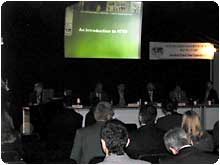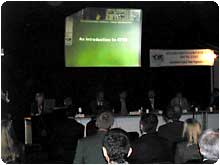Sustainable Forest Management in the Tropics
- What it will take -
 |
 |
A side-event hosted by the International Tropical Timber Organization has explored the issues surrounding sustainable forest management in the tropics.
The side-event, which was organized in cooperation with the governments of Japan and Switzerland, the Wildlife Conservation Society, the Department of Natural Resources of the Philippines, and the Brazilian state of Acre's Funda o de Tecnologia (FUNTAC), attracted about 90 people.
The event was moderated by ITTO's Executive Director, DR. MANOEL SOBRAL FILHO, who remarked that the primary obstacle to achieving widespread sustainable forest management in the tropics was its low level of financial competitiveness compared to other land uses such as agriculture. He said that timber alone would not fund sustainable management in many natural tropical forests and suggested that the 'global' services provided by such forests, including biodiversity conservation and carbon storage, need to be paid for if the forests are to be conserved.
H.E. AMBASSADOR BEAT NOBS, Head of the International Affairs Division of the Swiss Agency for the Environment, Forests and Landscape, spoke about Switzerland's determination to assist tropical countries in avoiding land management mistakes such as those made in his own country in the 18th and 19th centuries, when forest resources were over-used. He noted with 'great concern' that forests, and forest biodiversity, continue to be lost worldwide at a rapid pace. The careless destruction of forests and the illegal harvesting and trade of forest products leads to social unrest and hardships with effects extending far beyond the region in question, he said. He praised ITTO for its 'outstanding' contributions to promoting both sustainable forest management and timber production: it was the complementary nature of its objectives that 'makes the ITTO a unique organisation with unique instruments for the promotion of global sustainable development'. He suggested that ITTO had a central role to play in promoting sustainable forest management on an intersectoral basis.
MR. KEIJI IDE, Director of the Developing Economies Division of the Japanese Ministry of Foreign Affairs, pledged Japan's commitment to sustainable development and the sustainable management of tropical forests. He also reiterated Japan's support for ITTO and its commitment to the organization's objectives, recalling that the Government of Japan has been financing around fifty projects and other activities per year through ITTO. Mr. Ide also informed the participants on a WSSD Type II Initiative to Promote Forest Management in Asia, launched and led by Japan and Indonesia.
DR PAUL ELKAN, of the Wildlife Conservation Society, and his counterpart MR LUCAS VAN DER WALT, of the logging company CIB, presented an ITTO project aimed at bringing about sustainable forest management in a 1.2 million-hectare timber production forest in the buffer zone of the Noubale-Ndoki National Park in northern Congo. DR REX VICTOR CRUZ, Professor in Watershed Management and Land Use Planning at the University of the Philippines at Los Ba os, presented the results of an ITTO project to conserve biodiversity in tropical forests managed primarily for timber production in Surigao del Sur in the Philippines, and DR ZENOBIO DA GAMA SILVA outlined the progress being made to integrate forest-based development in the western Amazon through another ITTO project.
DR EVA MUELLER, of the ITTO Secretariat outlined ITTO's contribution to the Congo Basin Forest Initiative, and the Secretariat's ALASTAIR SARRE gave a brief overview of the Organization's policy and project work.
Towards the end of the event, Brazil's Minister of Environment, Dr Jose Carlos Carvalho, spoke about Brazil's efforts to bring about sustainable development in the Amazon. He said that despite the work of government and its many civil society partners, more international cooperation was needed, especially in the development of renumerative sustainable forest management regimes. He commended ITTO for backing its words with action in support of national and local initiatives.
After summing up the lessons to be gleaned from the presentations, DR SOBRAL invited questions and comments from the audience.
Back to Index
